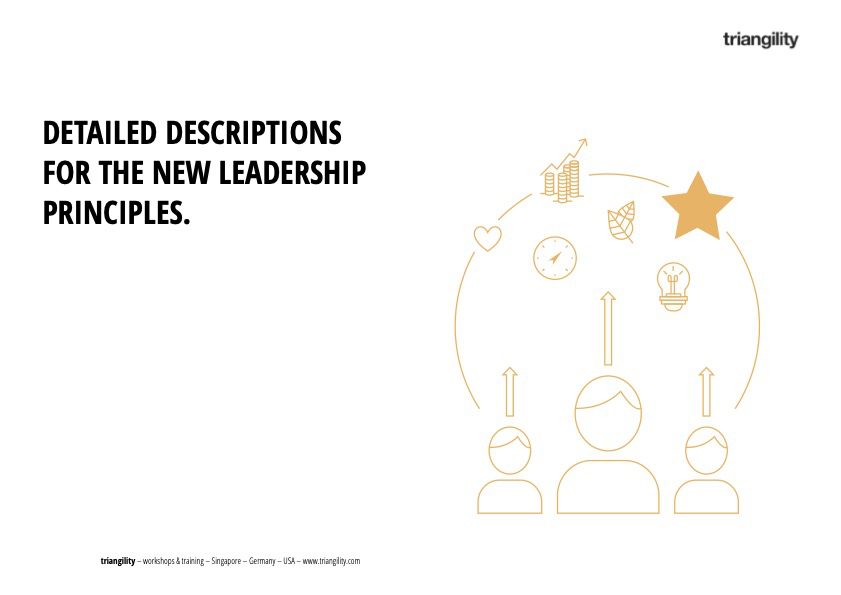New Leadership is a modern leadership approach that puts people at the centre and aims to enable effective leadership even in situations where the manager’s existing knowledge and experience are not sufficient. This approach emphasises the following principles:
People at the centre:
New Leadership emphasises the importance of the individual employee and promotes a culture of empathy, appreciation and collaboration.
Effective leadership despite uncertainty:
Managers are supported in leading effectively even in complex and uncertain situations by demonstrating flexibility, a willingness to learn and a spirit of innovation.
Responsibility across organisational boundaries:
New leadership involves taking responsibility that goes beyond the immediate interests of the company. This includes ethical behaviour and sustainability as well as social and ecological responsibility.
Open approach to technological trends:
An open and responsible approach to new technological developments is central. Managers must be prepared to undergo continuous further training and to critically assess the opportunities and risks of new technologies.
Overall, New Leadership promotes an integrative and adaptive management philosophy that aims to successfully master the challenges of the modern working world and at the same time create a positive, future-oriented corporate culture.
You are currently viewing a placeholder content from YouTube. To access the actual content, click the button below. Please note that doing so will share data with third-party providers.
More InformationThe world of work has changed. Employees today value completely different things than they did a few years ago (left):
If the demands of employees change, leadership must also change. And this not only brings challenges, but also great opportunities: employees are evolving from mere “recipients of orders” to committed team members who want to get involved, make a difference and actively bring about change.
Conversely, your employees also want to be seen as the individuals they are. They want to be involved and take responsibility for an issue. Managers take on this task by offering effective New Work leadership, establishing new ways of working and thus enabling the world of work 4.0.
New Leadership Principles help managers to deeply embed the topic of New Leadership. The needs of employees play a central role in this. The New Leadership approach aims to promote cooperation, participation and personal responsibility among employees.
The development of the manager is also interesting: they are transformed from the head and sole decision-maker into a supportive leader, mentor and coach.
Managers who act according to the principles of New Leadership do not make decisions solely over their employees – they motivate, support, provide orientation and create a breeding ground for change.
There are various leadership concepts associated with New Leadership:
Digitalisation, new work, sustainability, AI: every topic is new. Managers today are facing completely different challenges than just a few years ago. Order, stability and control, the previous core values of leadership, are being replaced and are becoming less important. New ways of working and the nature of leadership must change. To master this, new competences are important.
The problem: around 70% of managers do not know how to develop these skills effectively. This is where we come in: together with Karlshochschule International University, we have analysed various leadership models and worked out their basic principles and specific skills.
All models had to meet three criteria:
They are supported by data and scientific literature
They put people at the center
They are already being used and there is sufficient feedback accordingly


Mental Model
Rather than

Behavioral Model

Identity

Mindfulness

Decision making

Relationships

Culture

People Development
Rather than

Motivation

Organization

Viability

Alignment

Workplace

Performance

Innovation

Technology

Stakeholder
Rather than

You are currently viewing a placeholder content from Zoho Forms. To access the actual content, click the button below. Please note that doing so will share data with third-party providers.
More InformationWould you like to cultivate New Leadership in your company? And would you like to tailor all measures specifically to your company?
We tailor our formats to your needs and the needs of your managers and teams. We offer you a free co-creation (90 min). Let’s start with an initial consultation!

Core principles, competences and practices for modern leadership.
New leadership offers several advantages for a company. Firstly, and most importantly, the world has become much more uncertain for companies and managers. Traditional leadership is based on the knowledge and experience of managers. However, this is often useless in completely unknown situations. New Leadership enables effective leadership in the face of great uncertainty. The new leadership approaches help to act safely despite uncertainty and enable co-creative collaboration between people.
This new leadership also offers companies the opportunity to deal openly with megatrends, social transformations and new technologies. These are the fuel for strategic decisions, new opportunities and positive change. New leadership also strengthens employee loyalty to the company, attracts talent, can react more quickly to change and unleash creative power that leads to innovation and makes companies more resilient.
New leadership differs from traditional leadership styles through a new paradigm. Traditional leadership focusses on order, structures, stability and scalability. To achieve this, managers and executives have learnt a comprehensive toolbox and many methods. Always with the aim of achieving a high degree of controllability. New Leadership, however, expands this paradigm. This type of leadership recognises that complexity is increasing and that decisions have to be made in the face of great uncertainty.
New Leadership therefore broadens the spectrum for managers and offers principles, competences and methods to lead effectively even in the face of uncertainty, complexity and dynamics. It is therefore more than a leadership style, it is a new understanding of leadership and requires a new attitude.
New leadership requires new competences, such as creativity, systemic thinking, resilience, emotional intelligence, complex problem solving, active learning and agile collaboration. These competences are the result of a combination of skills, new knowledge, motivation, talent and experience. If you bring along a portion of curiosity and the ability to self-reflect, then you already have New Leadership approaches.
According to our concept, you will not learn these competences in isolation, but in a flow and in the context of your specific challenges.
The principles help you to implement New Leadership in your team. If you know the meaning of New Leadership, then you start to “do things differently and do different things.” You change ways of working, consider the differences between complicated and complex problems, increase your team’s awareness and work together differently. Each principle provides food for thought for reflection and new options for action. We have even developed a card game that you can use when working with your team.
Various challenges can arise when introducing New Leadership. Firstly, new leadership requires certain behaviours to be radically changed. This creates uncertainty – both among managers and teams. In this phase of uncertainty, there is a risk of falling back into old patterns and underestimating the importance of new leadership.
Another challenge is unconscious conditioning and beliefs that are called into question by new principles and working methods. New leadership means, for example, that the manager is no longer the (sole) decision-maker, but that teams are empowered to make decisions with the help of new methods. In addition, tensions often arise because structures, processes or tools still originate from an old work culture and hinder New Work and New Leadership.
Further training in the area of New Leadership can help perfectly. They make the differences between various paradigms clear and provide the necessary knowledge. In addition, training courses enable people to try out new practices, methods, tools and behaviours in a protected environment.
New leadership has a significant impact on employee loyalty and satisfaction. People today want more development and autonomy in their work, room for manoeuvre and self-determined working methods. According to the New Leadership definition, the focus is on people and their strengths and potential – and this promotes development and freedom. This type of leadership creates vibrant cultures in which people like to stay and which in turn attract others.
The New Leadership approach helps managers to recognise the significance of new trends and developments more quickly. They develop a hyper-awareness of the environment and derive opportunities from this. Technological developments such as artificial intelligence, the handling of data and algorithms, virtual or augmented reality also offer new opportunities for the transformation of companies. They change working methods in teams, but require new skills.
In addition, all companies are affected by the massive shift towards sustainable corporate management. Managers therefore need an understanding of the different categories of sustainability, legal obligations and strategic opportunities. However, they also need to develop a working culture that integrates various stakeholders and enables concrete changes by managers and all employees.
New leadership is a concept that requires new skills and competences from managers on the one hand, but also a change in structures on the other. At the macro level, these are new forms of organisation and collaboration (for example, across departments, cross-functional, cross-hierarchical, including external stakeholders), while at the micro level, projects or meetings are conducted differently.
In order to implement the New Leadership approach in the company, people and structures need to work together. This could take place in the following phases:
Preparation (co-creation)
Conceptualisation
Training
Mentoring
Organisational development
Anchoring
We offer specific further education and training programmes on the topic of new leadership. We have developed a 12-day programme that covers all aspects of new leadership and can be adapted to suit your company.
However, most of the programmes we develop for our clients are tailor-made. After a joint co-creation, we create a concept that addresses the specific challenges and conveys the necessary principles and competences. These programmes vary in length: from 4 days to 13 days over a period of 0.5 – 1.5 years.
The content and formats of our New Leadership training courses are organised according to the 4 domains: Leading yourself, leading others, leading business and leading beyond. Our work is fundamentally experience-based. This means that you get to know new approaches, concepts, working methods etc., but then try them out straight away. We support peer learning
All of the trainers in our team have extensive experience in designing and supporting transformation processes, have all completed in-depth external coaching and/or trainer training and have also taken part in our internal train-the-trainer programmes. In addition, each of them has individual knowledge and experience on topics such as AI, futures design, sustainability, innovation, etc.
Do you have questions about New Leadership and the Principles? We look forward to talking to you! We will be happy to answer your questions about your goals, topics, requirements and framework conditions for your transformation – and of course about dates and costs. Please write to Verena using the contact form.
You are currently viewing a placeholder content from Zoho Forms. To access the actual content, click the button below. Please note that doing so will share data with third-party providers.
More Information
Get our latest eBook for free!

Discover the 7 management mistakes that hold many companies back – and practical tools that can help you overcome them and break through.
You are currently viewing a placeholder content from Zoho Forms. To access the actual content, click the button below. Please note that doing so will share data with third-party providers.
More InformationYou need to load content from reCAPTCHA to submit the form. Please note that doing so will share data with third-party providers.
More InformationYou are currently viewing a placeholder content from Google Maps. To access the actual content, click the button below. Please note that doing so will share data with third-party providers.
More InformationYou are currently viewing a placeholder content from Mapbox. To access the actual content, click the button below. Please note that doing so will share data with third-party providers.
More InformationYou are currently viewing a placeholder content from OpenStreetMap. To access the actual content, click the button below. Please note that doing so will share data with third-party providers.
More Information